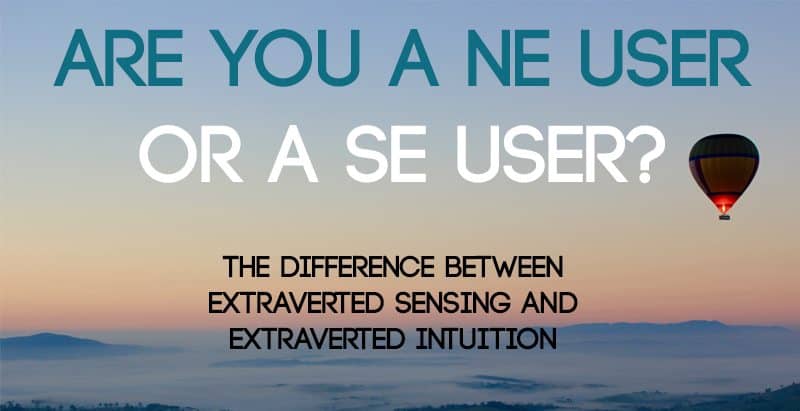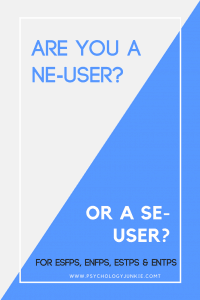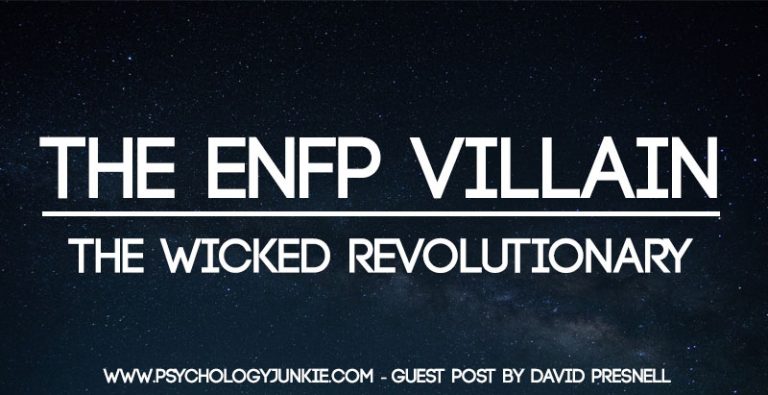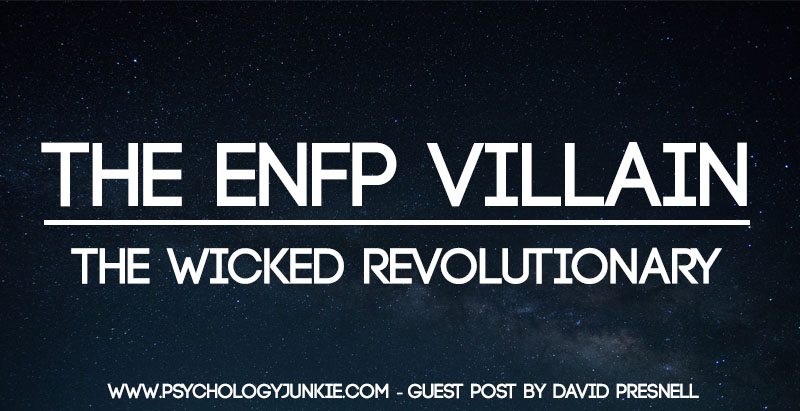Are You a Ne User or a Se User? The Difference Between Extraverted Sensing and Extraverted Intuition
With the advent of free online “personality” tests, there are thousands of people who are being mistyped or who are confused by their type results. Numerous ESFPs are mistyped as ENFPs and many ESTPs are mistyped as ENTPs. A lot of the free online tests have an intuitive bias which makes it much more unlikely that a sensor will get a sensor result. In this post, I want to make the difference between Extraverted Sensing (the dominant function of the ESTP and ESFP) and the difference between Extraverted Intuition (the dominant function of the ENTP and ENFP) clear so that mistypes can be resolved and anyone reading this can understand themselves better.
People with dominant Extraverted Sensing are called Se-dominant. People with dominant Extraverted Intuition are called Ne-dominant. There are huge differences between Se and Ne, and neither one is better than the other. ESTPs and ESFPs make up about 21% of the population, while ENTPs and ENFPs make up about 11.5% of the population.

Not sure what your personality type is? Take our new personality questionnaire here. Or you can take the official MBTI® here.
Intuition and Sensing as Perceiving Functions
Each personality type has a favorite perceiving function and a favorite judging function. The perceiving function (either sensing or intuition) determines how we absorb information and which things we notice and trust. The judging function (either thinking or feeling) determines what we consider when we make decisions. SP types prefer to absorb information through Extraverted Sensing, while NP types prefer to absorb information through Extraverted Intuition.
Extraverted Sensors:
– Are adaptable and easy-going
– Are realistic and down-to-earth
– Are practical and matter-of-fact
– Are excited by adventure and thrills
– Live “in the moment” and prefer to focus on the here-and-now
– Are fond of concrete facts and are aware of details
– Learn best from hands-on experience
– Seek stimulation by experiencing life in a hands-on, immersive way
– Have a “live and let live” mentality
– Tend to be impulsive and trust their impulses
– Are fun-loving and optimistic
– Pride themselves on being bold, unconventional, and spontaneous
– Prize freedom
– See all the details around them
Extraverted Intuitives:
– Are always thinking of possibilities and what “could be”
– Focus on the future much more than the present
– Are original and independent
– Love to start and initiate creative projects, but struggle with completing projects
– Work in bursts of impulsive energy
– Hate routine
– Seek and trust inspiration and are willing to follow it anywhere.
– Tend to be enthusiastic and good with people
– Love to inspire and motivate others
– Find hidden patterns, possibilities, and potentials
– See so many alternatives that they can have trouble focusing on just one thing
– Are open-minded and slow to form premature conclusions
– See things in impressions and focus on “the big picture”
How the Extraverted Sensor Thinks:

Extraverted sensors are some of the most realistic personality types. They see things as they are and accept facts readily, making the most of whatever situation they find themselves in. Where the Ne-user sees what “could be” and is always striving to see potential, the Se-user sees what “is” and tries to enjoy and use what they can in the moment. They are extremely observant and aware of all the details of their physical world, and often know how to maneuver throughout life in a graceful way because of their awareness.
In language, Se-users are direct and concrete. They see little point in beating around the bush or rambling. They can quickly and practically evaluate situations and people to make sound estimations regarding their usefulness and abilities.
Extraverted Sensors and Their Relationships with Others

Se-users enjoy the world, their surroundings, and the people in their lives without feeling the need to change them. This gives them a very easy-going, live-and-let-live personality that others find enjoyable and freeing to be around. They believe in accepting everyone for who they already are, and they’re unlikely to push anyone to fit a particular mold. This doesn’t mean they never get irritated at other people’s differences, but they’re unlikely to dwell on it for long, instead focusing on how to make the best of who that person already is without alterations.
Extraverted Sensing and Learning

Se-users are very hands-on people, and tend to be kinesthetic learners as children. They learn best by doing, and would rather just get right into something and work with it with their hands than read a manual or spend a lot of time in intense study. They have remarkable physical knowledge and the ability to grasp how things work as they feel them physically.
While Se-users may not be the ones to grab a manual when they’re trying to fix something, they still love to collect facts. They are curious and excited by new and novel things. They often have a tremendous storehouse of facts on random subjects in their mind and they are always curious to know more.
Extraverted Sensing and Lifestyle

Se-users thrive on experiencing new sensory pleasures; new food, scenery, people, activities, adventures. Se-users trust their impulses and believe in enjoying life to the fullest. They love physical enjoyment, from good food to quality clothes, music, artwork, and even the beauties of nature. They believe life is to be grasped and enjoyed, not changed or altered. They often make fun-loving companions, gifted storytellers, and open-minded confidantes.
New things that cannot be grasped or enjoyed by the senses are less interesting to Se-users; abstract ideas, theories, or existential conversations. Because Se-users are above all focused on what is real, focusing on theories and unproven, unseen possibilities can bore them.
Se-Users prefer to live without a detailed plan, and hate to be micro-managed. They thrive on freedom and taking care of problems as they arise. Because they are less focus on what things “could” be or how things “should” be, they are able to fully enjoy all the blessings of the moment. When it comes to a crisis, Se-users are the best types to have on hand. They are quick to find solutions and take in the details around them, finding rapid ways to alter their surroundings to solve a problem or get out of a precarious situation. They fully believe that they will find solutions as problems arise, and don’t waste time worrying about negative possibilities. Worry is deemed wasteful and useless to the Se-user. They thrive on being fearless, brave, and optimistic.
How the Extraverted Intuitive Thinks:

Ne-users are driven by their inspirations and by intuitive visions of what could be. They have extremely active minds that are always giving them flashes of potential outcomes. Ne users are driven by intense bursts of energy and inspiration that push them forward like a flood, urging them to realize their visions. They find the world of possibilities and new innovations and adventures nearly irresistible in its pull. The only problem with this, is that once their vision is seen or believed in by other individuals they can often lose their interest in it and be driven by another new idea or possibility. While Judging types might consider the Ne-lifestyle fickle and ever-changing, it’s not to be looked down upon. Ne-users make sure that human inspirations are not wasted, that dreams see the light of day, and that possibilities are believed in. Walt Disney, an Ne-dominant personality type, conceived many more ideas than he ever built to completion, yet he was able to change the world and with his vision, and the help of other great minds, he was able to see many of his inspirations become a reality.
Ne-dominants lives tend to be a series of projects; they live from one possibility to the next. Being their friend is sure to inspire you and open your mind to innovative new ideas. The Ne-users imagination is boundless and intensely creative. Oscar Wilde, Alduous Huxley, Hunter S. Thompson, J.R.R. Tolkien were all Ne-users who saw their imaginative visions come to life in their stories. Unlike Se-users, who see what “is” and have a very realistic, down-to-earth view of the world, Ne-users are driven by what “could be” and are rarely satisfied at leaving things as they are. Everything must be improved upon, everything must reach imaginative new heights.
Extraverted Intuitives and Their Relationships with Others:

Ne-users are open-minded with their friends and loved ones. They enter relationships and friendships with a desire to be inspired and learn something new. They are slow to form conclusions or to judge anyone, and they’re always up for hearing a new perspective on something. They love discussing theories, plans, possibilities, and abstract ideas. They can enjoy a good debate and love long discussions about the endless opportunities and visions their intuition gives them.
Ne-users are sometimes idealistic about their partners in relationships. Because they are so focused on the potential of everything, they can try to motivate their partners to try new things or reach new goals. This can be a very positive thing, but it can also be a negative thing if their partner feels like they are always being pushed to grow and are never okay just as they are.
Extraverted Intuition and Learning

Ne-dominant personalities are known for being labeled ‘gifted’ in school. They tend to score above average on aptitude tests, but they perform middle-of-the-road in terms of grades.
ENFPs sometimes struggle in school, because they need something that sparks their imagination to keep their mind focused on their studies. Rote bookwork and repetition is incredibly boring and frustrating for them to live with. Their minds wander to more imaginative pathways if they aren’t being stimulated by what their teachers are showing them. For this reason, they sometimes are mislabeled as ADHD because they can have trouble paying attention in class if their teachers are more focused on repetition, memorization, and cold hard facts.
Is One Type Better Than Another?
Both Se and Ne users are equally important and vital. Se helps us to appreciate the moment, what is happening now, and what we have at our fingertips. It is quick-thinking in a crisis and knows how to handle real-world crises with amazing practical ingenuity. Se helps us to richly enjoy every sight and sound and texture and taste.
Ne users help us to be inspired by endless possibilities. It opens up our imagination to new worlds and ideas that we may have never considered before. It brings to life a type of magic and wonder that creates delight and innovation in the world. Ne and Se users are both open-minded and motivated by challenges, but while the Se user will provide practical, hands-on solutions to a problem, the Ne-user will provide inspiration to keep going and jump-start new avenues of progress.
What are your thoughts?
Share your experiences and insights in the comments!
Find out more about your personality type in our eBooks, Discovering You: Unlocking the Power of Personality Type, The INFJ – Understanding the Mystic, and The INFP – Understanding the Dreamer. You can also connect with me via Facebook, Instagram, or Twitter!























I have no idea which one I am! I always type as an ENTP but when I first took the test in High School I got ESTP. I love new stimulations and the present moment and I always like to look up theory every day. Not sure which I am!
Theory sounds more and more like Ti but what happens after you “Se” for a while? Do you find yourself considering possibilities? Do you find yourself going “mental” after a period of “sensing”?
I would be very interested in seeing how Si and Ni are alike and different.
Hey Susan, this is a helpful article…thanks!
I’d love a good book for ESFPs. Heidi Priebe has two fab books on INFP and ENFP but I don’t see such a good resource for Se doms unless you know one?
Bonnie
Hi Bonnie! I am hoping to write a book for each of the sixteen types over time. It may take a while to get to ESFP, but please stay tuned! I feel very sad that there are so few resources for Se-doms online!
I don’t think all Ne users are “mislabeled” as having ADHD, many truly do have it. That statement makes it seem as if people with ADHD don’t have a personality type. I am an ENFP with ADHD and I think my ADHD has definitely shaped my personality and how my brain works. If I didn’t have it, I likely would have a different personality type. I often wonder what different effects neurodevelopmental disorders have on people’s personalities.
You’re correct, and I appreciate you pointing this out. Plenty of Ne-users do have ADHD (as well as plenty of other types). I’m not sure if there have been any studies done relating type to ADHD, but that would be interesting. My point is that there’s a stereotype about ENxPs that they all have ADHD – or that Ne is another symptom/form of ADHD, and that’s what I wanted to clarify.
Thank you for your article. It helped me alot. Very clear and informative